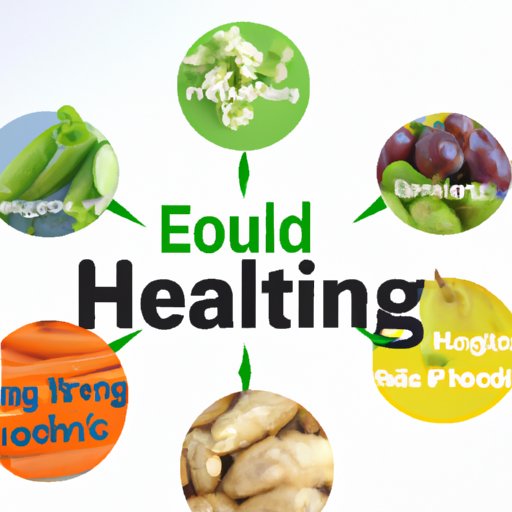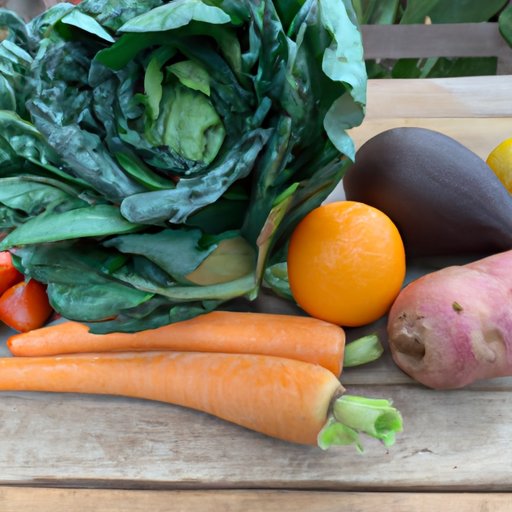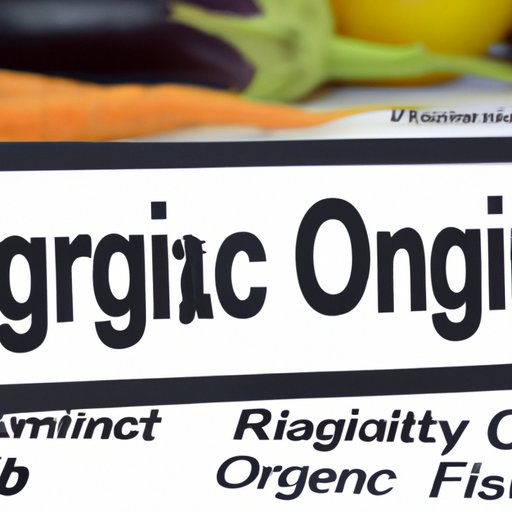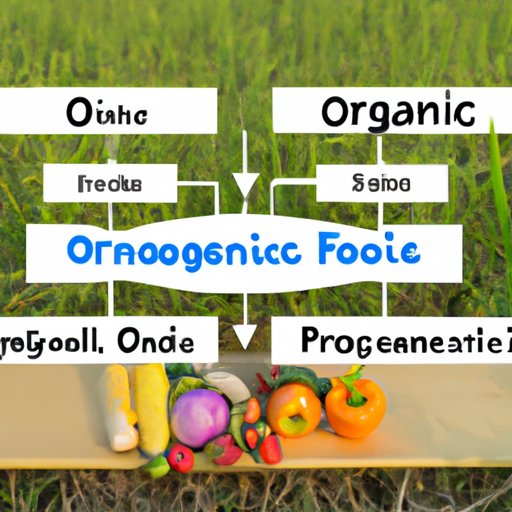Introduction
Organic foods have become increasingly popular in recent years. But what exactly are organic foods, and are they really healthier than non-organic foods? In this article, we’ll explore the benefits and drawbacks of organic food production and consumption. We’ll look at the nutritional value, environmental impact, health benefits, cost difference, regulations, and safety associated with organic foods.
Comparing the Nutritional Value of Organic vs. Non-Organic Foods
Research has found that organic foods can have higher levels of vitamins, minerals, and other nutrients than non-organic foods. According to a study published in the British Journal of Nutrition, organic fruits and vegetables contain 17–40% more antioxidants than conventionally grown produce. Antioxidants are important for fighting free radicals and protecting against disease.
Organic dairy products have also been found to be higher in beneficial fatty acids. A review of the literature published in the journal Frontiers in Nutrition concluded that organic milk contains 50% more omega-3 fatty acids than conventional milk.

Health Benefits of Eating Organic Foods
Eating organic foods may offer some health benefits that non-organic foods do not. Studies have found that organic produce contains fewer pesticides and other chemicals than non-organic produce. For example, a 2018 study published in the journal Environmental Research found that organic strawberries contained significantly fewer pesticide residues than conventional strawberries.
Organic foods may also contain fewer toxins, such as heavy metals. A 2020 study published in the journal Science of the Total Environment looked at the levels of cadmium, lead, and mercury in organic and non-organic wheat. The researchers found that organic wheat had significantly lower levels of these toxins than non-organic wheat.
Examining the Environmental Impact of Organic Farming Practices
Organic farming practices can have a positive effect on the environment. Sustainable agriculture is a key component of organic farming. This involves using methods such as crop rotation and cover crops to improve soil fertility and reduce erosion. Organic farmers also use natural fertilizers, such as compost, rather than synthetic fertilizers.
Organic farming also helps to conserve natural resources, such as water and energy. A study published in the journal Agriculture, Ecosystems & Environment found that organic farming uses 20–50% less energy than conventional farming. Additionally, organic farming uses less water than conventional farming because it relies on rainwater and irrigation systems that use less water.
Organic farming also reduces the amount of chemicals used on crops. A 2019 study published in the journal Science of the Total Environment analyzed the effects of organic and conventional farming on soil health. The researchers found that organic farming resulted in significantly lower levels of chemical contamination in the soil.

Exploring the Health Benefits of Eating Organic Foods
Eating organic foods can provide numerous health benefits. One benefit is improved nutrition. Organic produce contains higher levels of vitamins and minerals than non-organic produce. It also has a higher concentration of antioxidants, which can help protect against disease.
Another benefit of eating organic foods is a lower risk of contamination. Organic foods are produced without the use of chemical pesticides or fertilizers, which can be toxic when ingested. Organic foods are also free from antibiotics and growth hormones, which can be harmful to humans.
Finally, eating organic foods can help prevent antibiotic resistance. Antibiotics are commonly used in conventional farming to promote animal growth and prevent disease. However, overuse of antibiotics can lead to antibiotic resistance, making infections harder to treat.
Investigating the Cost Difference Between Organic and Non-Organic Foods
Organic foods tend to be more expensive than non-organic foods. A study published in the Journal of Food Distribution Research found that organic produce was, on average, 19% more expensive than conventional produce. However, prices can vary depending on the type of product and where it is purchased.
The availability of organic products is also a factor. Organic foods can sometimes be hard to find in certain areas. Additionally, some organic foods may be available only seasonally or in limited quantities.

Analyzing the Regulations Surrounding Organic Food Labeling
Organic foods must meet strict standards set by the United States Department of Agriculture (USDA) in order to be labeled as “organic.” These standards include requirements for organic certification and labeling.
Organic certification involves an extensive process of inspection and verification. Organic farms must demonstrate that they are using sustainable farming practices, such as crop rotation and cover cropping, and avoiding the use of synthetic fertilizers and pesticides.
Organic labeling also has strict requirements. Organic products must display the USDA organic seal, as well as the name of the certifying agency. The label must also indicate whether the product is 100% organic, organic, or made with organic ingredients.
Evaluating the Safety of Organic Pesticides and Fertilizers
Organic farming uses natural pesticides and fertilizers instead of synthetic ones. Commonly used organic pesticides include neem oil, pyrethrin, and copper sulfate. These pesticides are generally considered safe for human health and the environment.
Organic fertilizers, such as manure and compost, can also be beneficial for soil health. However, some organic fertilizers, such as sewage sludge, can contain hazardous substances that can be harmful if ingested. Therefore, it is important to research the safety of any organic fertilizer before using it.
Conclusion
Organic foods can offer numerous benefits, including higher levels of vitamins, minerals, and other nutrients; fewer toxins; and a lower risk of contamination. Additionally, organic farming practices can have a positive effect on the environment. However, organic foods can be more expensive and difficult to find than non-organic foods.
Organic foods must meet strict standards set by the USDA in order to be labeled as “organic.” Finally, organic pesticides and fertilizers can be safer for humans and the environment than synthetic ones, but it is important to research their safety before using them.
In conclusion, while organic foods can offer some health benefits, there are also potential drawbacks to consider. Further research is needed to better understand the long-term effects of organic food production and consumption.
(Note: Is this article not meeting your expectations? Do you have knowledge or insights to share? Unlock new opportunities and expand your reach by joining our authors team. Click Registration to join us and share your expertise with our readers.)
